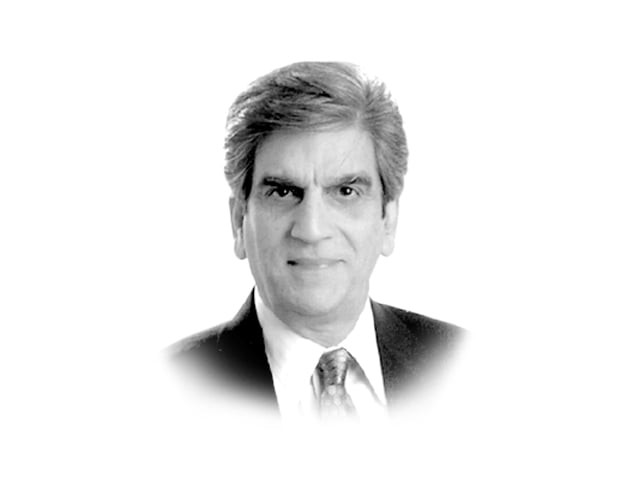A begging bowl in hand
Pakistan's delegation to IMF will explain that because of ‘ground realities’, we can’t do much on economic...

A begging bowl in hand
The spring meetings are generally a small affair with much fine dining and socialising, compared to the annual meetings in October. The delegations are typically small. However, Pakistan has, Allah be praised, sent a full contingent of worthies. And why not? Our prime minister, in a stirring show of genuine austerity, recently took only 50 people to watch a cricket match.
There is much speculation in the Pakistan press over what is likely to happen. To start with, the Pakistan delegation will meet with US officials. There they will explain to their incredulous audience that, because of our ‘ground realities’, we can’t do much on the economic policy front. Nevertheless, they will ask the US authorities to lean on the IMF to ‘go easy’ on us. What a deal! An easy-going IMF with no policy commitments on our part. Or at least none worth the paper it is written on and signed off on with great solemnity. As the American’s say, “It does not get any better than this!” What could be a worse manifestation of ‘moral hazard’? What could be a worse example of rewarding economic failure?
Of course, our delegation will have a little smugness and swagger about them with soaring exports on the back of rising global unit prices and mysteriously surging remittances which, taken together, have resulted in a record level of gross foreign exchange reserves. Thus, Pakistan does not have an immediate ‘balance of payments need’. Furthermore, if some of the plans to issue convertible bonds in international capital markets bear fruit, there may be further room to continue with our feckless economic policies, starting with a ‘pro-poor-people-friendly-relief budget’ for 2011-12 which, shorn of its verbosity, and looking past the obfuscation, lies and spin, will, in reality, have nothing to do with the poor or the people.
An IMF mission is expected to visit this coming May. The Pakistani press portrays this visit as a terrific break-through. It is, they hint, the recognition by the US and the IMF (words used interchangeably in Pakistan) of our international standing and undiminished nuisance value. Of course, they don’t put it that way. But the reality is that there is nothing untoward about a May visit. The IMF always turns up in May each year to assess our budget proposals. Both during and after their visit, the Pakistani media will insist that the IMF is preparing our budget for us. In the 17 years that I was associated with this IMF-Pakistan business, the IMF has never prepared the Pakistani budget. The IMF’s budget proposals and Pakistan’s budget proposals are usually poles apart in terms of credibility, structure, financing and needed policy actions. It is true that there is some convergence as talks proceed — with the IMF doing much of the converging, which may go some way towards explaining the mess we are in. When I asked a mission chief some years ago about the widely-held Pakistani view that the IMF was preparing our budget, he laughed and said, “I wish we were!”
Will there be another programme? The truth is I do not know. However, even if there were no follow-on programmes, IMF rules require that a member country with large exposure to the IMF has to submit to “post-programme monitoring” which includes, inter alia, six-monthly economic reviews. Of course under this ‘no-programme-no-financing scenario’, the IMF’s influence on Pakistan, limited as it is, will be hugely diminished. They will have no ‘leverage’ over the direction and content of our economic policies. The real question, however, is whether another programme will make a difference. In our long and chequered association with IMF-financed programmes, Pakistan has never completed a programme, save once. That was during the Musharaff regime when not only did Pakistan complete the programme; they declined the last tranche and sent the IMF packing back to Washington and their country club. How that programme was implemented, given our unblemished track record of programme failures, remains a mystery. Mr Shaukat Aziz was no economic magician but 9/11 was manna from heaven. But more to the point, Mr Aziz was surrounded by some notable, wily cookers. I suspect strongly, therefore, that the data was cooked to show compliance with programme targets. My suspicions, expressed long ago, evoked an angry response from the former government’s economic spokesperson, who said my remarks were “political” in nature and therefore lacked credibility. Moreover, he said disingenuously, our data had been “approved” by the best experts in the IMF, other multilateral organisations and, above all, the international rating agencies. Given the track record of especially the last-mentioned during the recent global financial crisis when they were assigning AAA+ ratings to worthless sub-prime mortgage-backed securities, one can only marvel at the naivety of such a view.
In conclusion, a follow-on programme, if implemented as shoddily as the last one, will only add another chapter to the depressing litany of failed programmes. Yet, Pakistan will muddle through as it has over the past 40 years, missing every target, seeking waivers for non-compliance and getting the targets reset to some distant date. No programme will yield the desired benefits if the timeline of adjustment is constantly pushed out. Reforms need to be implemented in a front-loaded manner for maximum impact. With elections looming and election-related spending set to soar without hope of genuine tax and expenditure reforms to get the budget under control, Pakistan’s outlook will remain shrouded in uncertainty with the balance of risks tilted on the downside.
Published in The Express Tribune, April 18th, 2011.















COMMENTS
Comments are moderated and generally will be posted if they are on-topic and not abusive.
For more information, please see our Comments FAQ